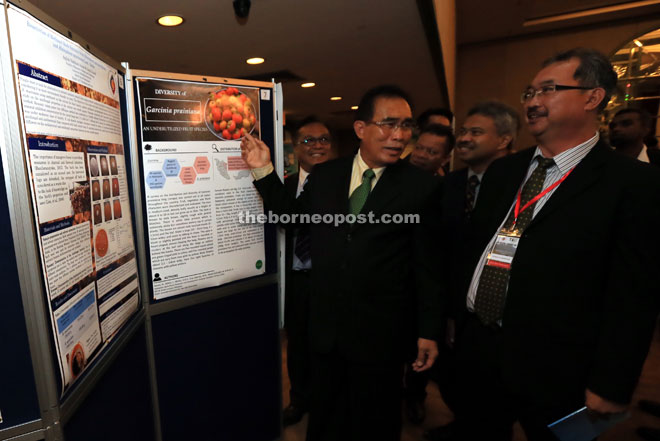
Len Talif (left) visiting one of the exhibition booths.
KUCHING: The state government is working towards building a Research and Development (R&D) Institute to enhance the capacity of taxonomists and ecologists in the state.
This serves to save the dying professions as there are only a handful of them around now, says Assistant Minister in the Chief Minister’s Office (Technical Education Promotion), Datu Len Talif Salleh.
Saying that taxonomists and ecologists were ‘endangered species’ not only in the country but also in the world, he said the R&D institute aimed to create a new generation of these researchers and researchers in other fields such as in pathology and botany.
“We have done the working paper but we cannot reveal the details yet because we are still in the discussion process.
“The discussions will involve various state government agencies like Land and Survey Department, Sarawak Forestry Corporation, Forest Department and Agriculture Department,” he said after opening the ‘The Regional Taxonomy and Ecology Conference 2015 (TEC 2015) organised by Universiti Malaysia Sarawak (Unimas) here yesterday.
The university’s vice-chancellor Professor Dato’ Dr Mohamad Kadim Suaidi, Dean of the Faculty of Resource Science and Technology Associate Professor Dr Othman Bojo and organising committee chairman Professor Dr Ismail Jusoh were among those present.
Len Talif said the shortage of taxonomists and ecologists was due to the lack of interests among the younger generation in doing research work on nature, plants and animals, apart from the incentive factor.
According to the university’s head of Department of Plant Science and Environmental Ecology, Professor Isa Ipor, there were rising interests among students now in these fields because of growing awareness.
He also felt that to create interest among the young generation, students had to be more exposed to nature, wildlife and environment during their school days.
Earlier in his speech, Len Talif said through TEC 2015, participants, researchers or stakeholders could share their findings and expertise that would lead to the establishment of research and strong collaboration, networking and partnerships leading to the advancement of knowledge of various research disciplines of the exceptionally rich tropical flora and fauna.
He said the main tasks of biologists or taxonomist were collecting, describing, naming and classifying of the diverse life forms on Earth while ecologists were concerned about how organisms interacted with one another within their habitat and environment.
With the availability of sophisticated equipment, biologists, taxonomists and ecologists were able to obtain, analyse and interpret effectively, he added.
“The issues of biodiversity, natural resources, environment, exploitation and deforestations are not only of a national concern but have become one of most global major issues which invoke heated debates on poverty, climate change, economy and trade.
“As such, we need to promote awareness and practise wise use of the remaining natural resources,” he said.
TEC (2015) has attracted 150 participants including those from Indonesia, Brunei, United Kingdom and Hawaii.
